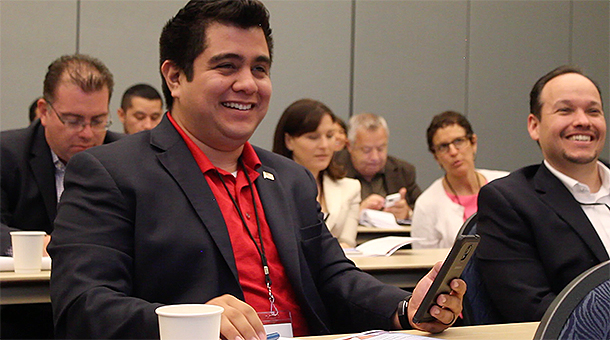
Cudahy Mayor Cristian Markovich at the Southern California Latino Policy Center Summer 2015 Policy Forum held at Cal State Los Angeles (Photo Credit: John Guenther)
Making sure cities and schools aren’t left in the dust of rapidly changing technology was the topic of the Southern California Latino Policy Center forum on Saturday in Los Angeles.
“If Latinos are going to succeed in California, technology must be embraced and implemented in our communities,” said Luis Ayala, Mayor of Alhambra and Latino Policy Center Board President. “If we are left out, we’ll be left behind.”
Ayala also reminded those present that technology can help elected officials serve better.
An electronic poll of the elected officials in attendance showed they embrace technology and, in fact, use social medial as their primary method to reach the people they represent. And yet, ironically they don’t think the cities and schools they represent use technology wisely.
Government that is enhanced by technology can be a transformative force that can promote job creation, make services more cost-effective, increase public involvement and understanding, and to enable greater accountability for results.
But, to get that done, panelists urged the elected officials to make sure cities and schools have a strong plan for adopting new tech, instead of just buying technology for technology’s sake.
Superintendent Dr. Darryl Adams told the audience about Coachella Valley Unified School District’s successful rollout of 18,000 iPads, which has become a model for other districts, as opposed to the more high-profile failure at LAUSD.
Channeling the educational term “no child left behind,” Adams told the school officials that the mantra should be “Every child online.” To not achieve that, he said, is the equivalent of “educational malpractice.”
City officials were being urged to “have a plan and implement it.” And that plan not only should include an initiative investment, but a way to operationalize and manage the technology.
They were told that key audiences for technology are city employees themselves, the residents they serve as well as potential businesses and visitors to a city.
Norma Fernandez is the California Regional Manager for EveryoneOn, a non-profit that is working to implement strategies that link unconnected communities to the power of the Internet and technology.
She estimated that 20 percent of Los Angeles still does not have broadband in the homes–a number that her organization and others are urgently trying to address.
The attendees also discussed a key workforce issue in technology—how more Latinos can be attracted and recruited to the tech jobs pipeline that dominates California’s economy.
The meeting was held at the Edmund G. ”Pat” Brown Institute for Public Affairs at Cal State Los Angeles, where Executive Director Dr. Raphael Sonenshein welcomed the elected officials and reminded them of another sobering fact.
Los Angeles County ranked dead last in the percentage of voter turnout in among California counties in the June and November 2014 elections. The large Latino population of L.A. County, he warned, “will have our voice muted if we don’t turn that around.”
CA Fwd attended the meeting as part of its goal of working with innovators inside and outside of government to use technology to improve results, to promote pioneers and best practices, and to identify how regulations and statutes can be modernized to accelerate the adaptation of technology in the service of the public interest.
The Southern California Latino Policy Center is made up of school board members, city council members, and other local Latino elected officials who represent a new effort toward great accountability and a commitment to a higher standard of ethics and transparency.

